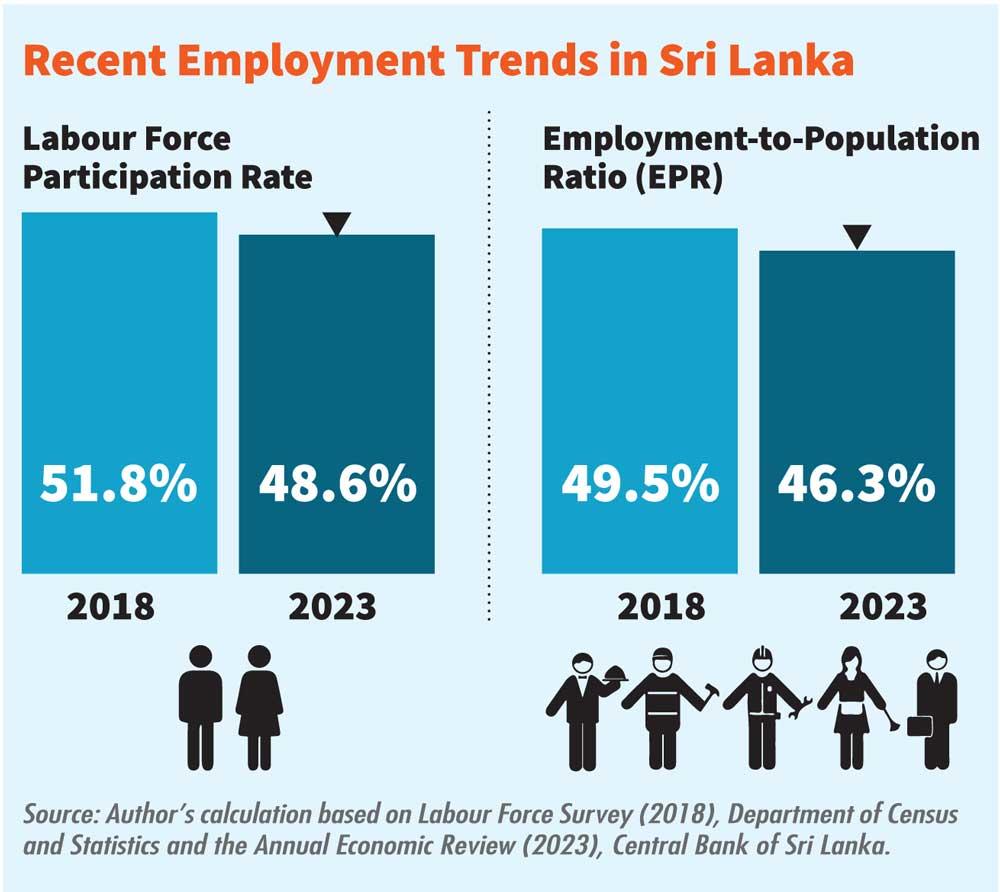Reply To:
Name - Reply Comment

By Nuzla Rizkiya
Sri Lanka’s labour market has seen an unexpected shift with unemployment rates decreasing slightly over the years despite the country undergoing a series of crises since 2019, according to research conducted by the Institute of Policy Studies (IPS).
Presenting the institute’s ‘State of Economy’ report last week, IPS Research Officer Suresh Ranasinghe revealed that despite the assumption that unemployment would rise during a crisis period, labour market data calculations showed 0.32 percentage point drop in the unemployment rate.
The employment-to-population ratio also saw a significant decline of 4.49 percentage points dropping from 49.5 percent to 46.3 percent, while the labour force participation rate fell from 51.8 percent to 48.6 percent between 2018 and 2023.
“The employment-population ratio has dropped mainly due to a 4.41 percentage point increase in labour market inactivity. That means the decline in employment-population ratio is mainly driven by the increase in labour market inactivity. This rise is particularly observed to be severe among youth, elderly workers, and those with low educational attainment,” Ranasinghe explained.
The growing problem of youth inactivity was a focal point of the analysis, where the role of technical and vocational education and training (TVET) was highlighted as a strategy to address the issue.
However, a prevailing misconception among graduates that only low opportunities and salaries can be attained through TVET programmes has discouraged participation, according to Ranasinghe.
“Youth inactivity is a growing concern at the moment. Therefore, it is really important to increase public awareness and update the education and training curriculums to meet both global and local demands,” Ranasignhe elaborated.
Another critical finding of the analysis was the alarming drop in labour productivity across the three major sectors—agriculture, industry and services, all of which recorded negative productivity growth throughout the crisis period.
In the industrial sector, both productivity and employment growth rates have remained negative, raising worrying trends for the country’s economic capacity, as 26 percent of the workforce is employed in this sector.
Similarly, the agriculture industry also showcased a disappointing picture, marked by low productivity, low living standards, low worker earnings, and insufficient investments in much-needed technology.
“The statistics not only raise concerns about the well-being of the workers but also about the nation’s overall food security and poverty alleviation efforts. Despite the low productivity, the sector still remains a critical component of the economy,” Ranasinghe stressed.
However, on a positive note, the analysis revealed that a few sub-sectors within the three major sectors such as wholesale and retail, education, transport and public administration displayed positive productivity growth.
Furthermore, the IPS research study revealed a sharp decline in high-skilled employment in Sri Lanka, which had dropped from a rate of 23 percent in 2018 to nearly 20 percent in 2023.
Ranasinghe attributed the downfall to the decline in the share of managers and senior officials in the country, a trend largely fueled by the emigration of skilled workers seeking better wages abroad.
He called for increased efforts to promote resilience and inclusivity in the country’s labour market through investments in various areas such as education, research, innovation, technology, infrastructure and skill development programmes.
“In order to retain the remaining high-skilled employment in Sri Lanka, it is essential to provide competitive salaries and benefits. In the long term, investing in knowledge-based industries and revising public sector policies related to high-skilled employment will become highly decisive,” Ranasinghe asserted.